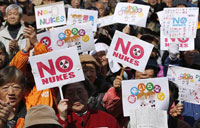Japan to revive nuke power reactors
(Xinhua) Updated: 2014-06-17 14:23
|
 |
| Japan underreports 640 kg unused plutonium to IAEA |
According to the report, 88 percent of Japan's energy consumption depended on fossil fuels in 2013 after all the nation' s reactors being offline in the wake of the Fukushima disaster in 2011. The reading is higher than the 80 percent at the time of the oil crisis in the 1970s.
The annual report said that imports of fuels such as liquefied natural gas rose 10 trillion yen (98.07 billion U.S. dollars) from 2010 to 27 trillion yen (274.79 billion dollars) in 2013, while CO2 emissions by utilities surged 112 million tons from fiscal 2010 to 486 million tons in fiscal 2012.
"Increasing imports of fossil fuels are seen as a problem not only on the energy front but also in the economic arena," said the report, adding that larger amount of CO2 emission would raise a question about Japan's stance in coping with global warming.
Japan used to embrace the peaceful use of nuclear technology to provide a substantial portion of its electricity. However, after the Fukushima nuclear accident, public sentiment shifted and there were wide public protests calling for nuclear power to be abandoned.
The Democratic Party of Japan decided on an energy policy that set targets for renewable energy and pledged to phase out nuclear power, but was swept from power by the Liberal Democratic Party in late 2012.
The incumbent government took pro-nuclear policy and retracted the nuclear phase-out goal from the Basic Energy Plan adopted in April.










